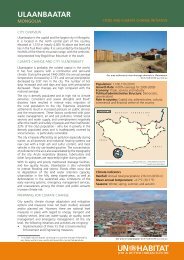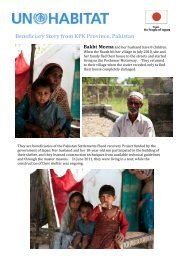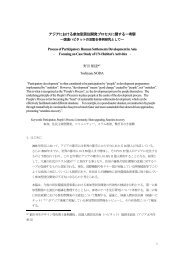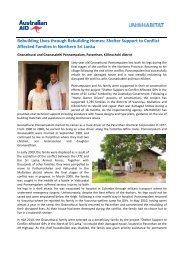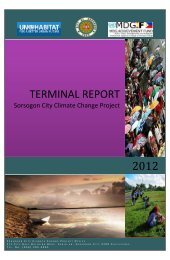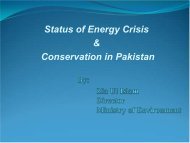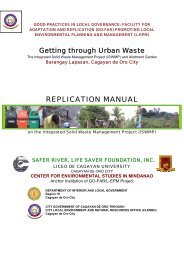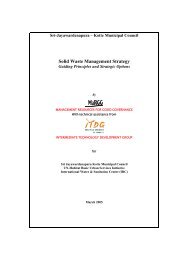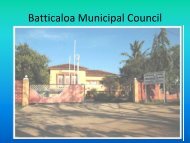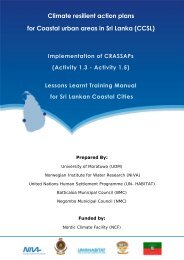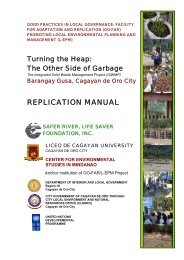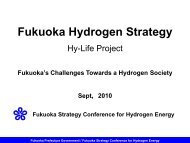Proceedings of the Dissemination Workshop On Climate Change ...
Proceedings of the Dissemination Workshop On Climate Change ...
Proceedings of the Dissemination Workshop On Climate Change ...
- No tags were found...
You also want an ePaper? Increase the reach of your titles
YUMPU automatically turns print PDFs into web optimized ePapers that Google loves.
<strong>Proceedings</strong> <strong>of</strong> <strong>the</strong><strong>Dissemination</strong> <strong>Workshop</strong><strong>On</strong> <strong>Climate</strong> <strong>Change</strong> and Gender10 th , April 2012 Hotel Greenwich Lalitpur, Nepal1. BackgroundUN-Habitat has come up with achecklist for mainstreaminggender under <strong>the</strong> second phase<strong>of</strong> Cities and <strong>Climate</strong> <strong>Change</strong>Initiatives (CCCI). The checklist is being tested in differentcountries and Nepal(Kathmandu Valley) is one <strong>of</strong>those few countries chosen byUN-Habitat. The purpose <strong>of</strong>testing <strong>the</strong> tool is (a) to test,tailor and disseminate <strong>the</strong>gender and climate changechecklist in <strong>the</strong> context <strong>of</strong>Kathmandu Valley (b) todisseminate <strong>the</strong> findings to <strong>the</strong> stakeholders for adaptation <strong>of</strong> <strong>the</strong> toolkit to mainstream gender inclimate change initiatives.The tool kit had three sets <strong>of</strong> questions i.e. for National, City and Neighborhood levels and<strong>the</strong>refore <strong>the</strong> testing was done through consultations at National, City and Neighborhood level.At <strong>the</strong> national level consultations were made with wide range <strong>of</strong> respondents, which includeindividuals at various Ministry, INGOs, NGOs and individual experts directly or indirectlyrelated to <strong>Climate</strong> change and Gender. Similarly consultation at city level was done withrepresentatives from KathmanduMetropolitan City (KMC), LalitpurSub Metropolitan City (LSMC)and Kirtipur Municipalityl;and atNeighborhood level threeneighborhoods (KMC Ward 18,LSMC Ward 12 and ThechoVillage a Suburban Neighborhood)were consulted. Respondents wereselected for representing widercross-section <strong>of</strong> <strong>the</strong> keystakeholders so that results reflectstrue picture..A dissemination workshop was
organized bringing toge<strong>the</strong>r individual experts who responded through e-mail, who participatedin <strong>the</strong> interaction, representatives from all <strong>the</strong> five municipalities in <strong>the</strong> Kathmandu Valley andrepresentatives from civil society organizations and grassroots organizations. The findings from<strong>the</strong> individual consultations, responses through e-mails and focus group discussions toge<strong>the</strong>rwith preliminary analysis and <strong>the</strong> way forward were presented by <strong>the</strong> consultant team in <strong>the</strong>workshop. Ideas were solicited from participants to validate <strong>the</strong> findings and contribute insuggesting what next so that gender can be mainstreamed in <strong>Climate</strong> <strong>Change</strong> Initiative.2. Objectives <strong>of</strong> <strong>the</strong> <strong>Workshop</strong>:The workshop was organized with <strong>the</strong> following objectives:• Presentation <strong>of</strong> <strong>the</strong> findings and way forward at national, municipal and neighborhoodlevel and validate <strong>the</strong> findings,• Receive feedback on <strong>the</strong> findings and for UN-Habitat to move aheadThe objectives <strong>of</strong> <strong>the</strong> dissemination workshop were achieved to a greater extent. For example (a)<strong>the</strong> findings from <strong>the</strong> test, reflections and suggestions were shared (b) a very good feedbackreceived on <strong>the</strong> presentations and way forward for UN-Habitat (what next)4. Participants <strong>of</strong> <strong>the</strong> dissemination workshopThe participants <strong>of</strong> <strong>the</strong> workshop included representatives from (a) Ministries like Ministry <strong>of</strong>Environment (MOE), Ministry <strong>of</strong> Local Development (MLD) and Ministry <strong>of</strong> Physical Planningand Works (MPPW) (b) INGOs, NGOs individual experts directly or indirectly related to climatechange and gender (c) Municipalities in Kathmandu Valley (d) Neighborhoods in KMC Ward 18,and LSMC Ward 12 and Thecho Village a Suburban Neighborhood (e) UN-Habitat ROAP,Fukuoka and Nepal and <strong>the</strong> consultant team. Altoge<strong>the</strong>r <strong>the</strong>re were 29 participants (17 Femaleand 12 male indicated good representations <strong>of</strong> women). All <strong>the</strong> participants irrespective <strong>of</strong> <strong>the</strong>irlevel <strong>of</strong> knowledge, gender and status contributed effectively to make <strong>the</strong> interaction successful.See Annex IV for <strong>the</strong> list <strong>of</strong> participants5. <strong>Workshop</strong> Methodology and ProcessThe workshop was basicallyconducted in an informal settingwith light opening closing and inbetweenpresentation <strong>of</strong> findings <strong>of</strong><strong>the</strong> test, way forward and free andfrank discussion to capture,comments and suggests from <strong>the</strong>floor.The workshop followed a logicalapproach, and started with (a)presentation <strong>of</strong> findings, reflectionsand suggestions at national leveland discussion and (b) presentation
<strong>of</strong> findings, reflections and suggestions at City and Neighborhoods levels and discussion. Theworkshop was facilitated by t Mr. Prafulla Man Singh Pradhan (consultant <strong>of</strong> UN-Habitat).6. Programme <strong>of</strong> <strong>the</strong> Interaction and results.The workshop lasted for half a day. The workshop was divided into four sessions (see Annex Ifor <strong>the</strong> Agenda). The first session started with welcome and opening remarks by Mr. PadmaSunder Joshi <strong>the</strong> Habitat Programme Manager (HPM) <strong>of</strong> UN-Habitat, brief introduction <strong>of</strong> Citiesand <strong>Climate</strong> <strong>Change</strong> Initiatives<strong>of</strong> UN-Habitat and testing <strong>the</strong>toolkit on CC and Gender byMs Lowie Rosales HumanSettlement Advisor from UN-Habitat Regional Office for <strong>the</strong>Asia and <strong>the</strong> Pacific (ROAP),opening remarks by Ms MeenaKhanal Joint Secretary <strong>of</strong>MOE and Ms Dawa Sherpa,Honorable Member,Constituent Assembly. SeeAnnex II for <strong>the</strong> openingremarks. Presentation by MsLowie Rosales also attachedThe second session was allocated for presentation <strong>of</strong> findings, reflections and suggestionsfollowed by interaction and way forward at national level. Representative from MLD Mr.Purosattam Nepal informed that <strong>the</strong> Ministry has a section dealing with Gender and SocialInclusion and some initiatives have been taken to prepare guidelines for local government atDistrict, Municipal and Village level incorporating <strong>Climate</strong> <strong>Change</strong>. He fur<strong>the</strong>r suggested thatUN-Habitat need to consult MLD to validate <strong>the</strong> findings <strong>of</strong> <strong>the</strong> test. Similarly representativefrom DUDBC/MPPW informedthat a focal person has beenassigned at Ministry level on<strong>Climate</strong> <strong>Change</strong> and UN-HABITAT need to consult <strong>the</strong>Focal person. Ms Suman Bisht<strong>Climate</strong> <strong>Change</strong> and genderexpert from ICIMOD raise <strong>the</strong>concern <strong>of</strong> <strong>the</strong> first question in<strong>the</strong> tool kit being ambiguous atnational level i.e. what climateinformation related to <strong>the</strong>livelihoods <strong>of</strong> men as comparedto women is <strong>the</strong> governmentproviding. There was someconfusion on exactly whatinformation is this question trying to target. Does <strong>the</strong> question mean (a) is <strong>the</strong> government
providing women and men information on <strong>the</strong> impact <strong>of</strong> CC on <strong>the</strong>ir respective livelihoods? or(b) Is <strong>the</strong> government analyzing how climate change is impacting <strong>the</strong> livelihood options <strong>of</strong>women and men and disseminating this information among <strong>the</strong> community and or (c) Isgovernment disseminating any information on climate change to <strong>the</strong> community so <strong>the</strong>y canassess <strong>the</strong> impact on <strong>the</strong>ir livelihood?. The response was all <strong>of</strong> <strong>the</strong>m. The participants in generalhad no comments on <strong>the</strong> way forward, however it was suggested that <strong>the</strong> report should be arolling document and updated with wider consultations. See Annex III for comments andsuggestions from <strong>the</strong> participants.The third session was allocated for presentation <strong>of</strong> findings, reflections and suggestions followedby interaction and way forward atCity and Neighborhoods levels.The comments from <strong>the</strong> floorinclude (a) <strong>the</strong>re are certainstatements like “inequalities andinjustices are not that distinctivein general” which cannot beagreed as inequalities andinjustice against women stillexists (b) <strong>the</strong> tool kit is fine andneed to be translated in Nepaliand o<strong>the</strong>r regional languages(c) <strong>the</strong> consultations at cityand Neighborhood level arenot adequate and (d) <strong>the</strong>reflections and suggestionsare fine, however it wouldhave been better if <strong>the</strong>questionnaire or <strong>the</strong> tool kitwould have been finalizedin consultation with <strong>the</strong> keystakeholders. And <strong>the</strong>secontext participantssuggested sharing <strong>the</strong> Tool Kit and <strong>the</strong> Report on <strong>the</strong> findings <strong>of</strong> <strong>the</strong> test with all <strong>the</strong> participants.Presentations on <strong>the</strong> findings, reflections and suggestions are attached as part <strong>of</strong> this workshopproceeding. See Annex III for fur<strong>the</strong>r comments from <strong>the</strong> participants.The fourth session was <strong>the</strong> wrap-up and closing session. <strong>On</strong> behalf <strong>of</strong> UN-Habitat, Ms. SudhaShrestha wrapped up <strong>the</strong> dissemination workshop and Mr. Padma Sunder Joshi gave word <strong>of</strong>thanks to all <strong>the</strong> participants and assured that UN-Habitat will make sure to address <strong>the</strong>suggestions by <strong>the</strong> participants.
7. Conclusion: The dissemination workshop to share and discuss <strong>the</strong> findings <strong>of</strong> <strong>the</strong> testing <strong>of</strong><strong>the</strong> tool kit on Impact <strong>of</strong> <strong>Climate</strong> <strong>Change</strong> on Gender is not a beginning and end in itself. Theworkshop provided insights for UN-Habitat to build upon what has been done so far andcontribute in addressing <strong>the</strong> impact <strong>of</strong> <strong>Climate</strong> <strong>Change</strong> on Gender. As suggested by <strong>the</strong>participants <strong>the</strong> findings need to be a rolling document and fine-tuned fur<strong>the</strong>r so that it can bevalidated at all level. Similarly <strong>the</strong> toolkit need to be finalized with wider consultations assuggested, translated into Nepali and o<strong>the</strong>r regional languages so that it can be understood andapplied with ease at all level for benchmarking <strong>the</strong> impact <strong>of</strong> <strong>Climate</strong> <strong>Change</strong> on Gender andplan actions to minimize <strong>the</strong> impact on gender at all level. As suggested by <strong>the</strong> participants UN-Habitat need to share <strong>the</strong> Tool Kit and <strong>the</strong> Report on <strong>the</strong> findings <strong>of</strong> <strong>the</strong> test with participants forcomments and suggestions.Annex I:
Agenda for <strong>the</strong> <strong>Dissemination</strong> <strong>Workshop</strong><strong>On</strong> <strong>Climate</strong> <strong>Change</strong> and Gender 10 th , April 2012S. No Activity details Timing RemarksRegistration and warming up 8900 – 9.3 01 Opening Session (informal) :• Welcome and opening Remarks• Brief on <strong>the</strong> initiative <strong>of</strong> UN-HABITAT on testing CC andGender• Remarks from dignitaries9.30 – 10.30 Facilitator: PrafullaPradhanPresenter:PS Joshi and Lowie RosalesMs. Meena KhanalJointSecretary MOEMs. Ang Doma Sherpa, CAmember2 Session I:Presentaion <strong>of</strong> findings atNational Level and discussion:• Testing modalities• Presentation <strong>of</strong> <strong>the</strong> findings and wayforward• Discussion9.30 – 11.15 Facilitator: PrafullaPradhanPresenter: Manjit DhakalRefreshment Break 11.15 – 11.303 Session II: Presentation <strong>of</strong> findingsat City and neighborhood Level anddiscussion• Testing modalities• Presentation <strong>of</strong> <strong>the</strong> findings and wayforward• Discussion11.30 – 12.45 Facilitator: PrafullaPradhanPresenter: Aarati Gurungand Prafulla Pradhan5 Wrap up and closing 12.45 – 13.00 Ms Sudha Shrestha and Mr.Padma Sunder Joshi, UN-HABITATLunch 13.00 – 14.00
Annex II: Notes from <strong>the</strong> Opening Session:Opening session remarks from Mr. P.S. Joshi, UN HABITAT• Mr. Joshi informed on general scope <strong>of</strong> UN HABITAT working areas which wasurbanization, climate change, cities and its impact• <strong>On</strong> gender issue he agrees that man is dominant in our society and culture while womanare more involved in household work, raising family and in nature conservation work.Therefore woman, in his view has to be emphasized more and <strong>the</strong>ir leadership in neededin all sector if we want to progress• Issue <strong>of</strong> water is more prominent in all urban settlement and that <strong>the</strong> case <strong>of</strong> water supplyis worsening day by day due to climate change. Use <strong>of</strong> water and how to conserve was inour culture (traditional knowledge) and smart use to water is not a new concept hepointed out. In his opening remarks, he agreed that new technologies can be brought inbut our traditional practice and understanding should not be forgotten.• Resource management comes with urbanization he added. He also stressed that womanare <strong>the</strong> most vulnerable to climate change impact, <strong>the</strong>refore woman’s issues should beacknowledged and addressedMs Meena Khanal, Joint secretary, Ministry <strong>of</strong> Environment• Ms Khanal thanked everybody on behalf <strong>of</strong> Ministry <strong>of</strong> Environment and informed aboutPPCR and its sensitiveness to gender issues• She focused on woman health in context <strong>of</strong> climate change impact and presented anexample <strong>of</strong> African women not only being involved in water collection for entire familybut spend <strong>the</strong>ir half day in managing water which she think is <strong>the</strong> case <strong>of</strong> Nepali womentoo• She agreed that any programs or project that government initiate should not only targetwomen as a passive receiver but should involve <strong>the</strong>m from <strong>the</strong> beginning <strong>of</strong> <strong>the</strong> program,<strong>the</strong>n only <strong>the</strong> program will be fruitful she added• Ms. Khanal mentioned about <strong>the</strong> recent work being done my Ministry <strong>of</strong> Environmenttoge<strong>the</strong>r with IUCN and UNDP on <strong>Climate</strong> <strong>Change</strong> and Gender. Process <strong>of</strong>mainstreaming gender in climate change discuss has already started she added• Fur<strong>the</strong>r she also informed about Ministry <strong>of</strong> Environment organizing <strong>the</strong> mountainconference recently where gender issues were raised constantly• She concluded saying that integration <strong>of</strong> gender in climate change dialogue has alreadybegun and ministry is taking small steps at a time but it needs constant backup. Sheinvited UN-HABITAT to contribute in <strong>the</strong> initiative <strong>of</strong> <strong>the</strong> MinistryMs Ang Dawa Sherpa, Honorable Member, CA• Ms Sherpa supported Ms Khanal statement and added that on-going process <strong>of</strong> formation<strong>of</strong> constitution should also play important part in addressing gender in <strong>Climate</strong> <strong>Change</strong>
• She focused on <strong>the</strong> pressing issues <strong>of</strong> Himalayan cities areas such as Namche Bazaar andSalleri• In her view, solid waste management is an urgent issue to be address in those region sowas <strong>the</strong> drinking water problem• She elaborated on how geopolitical condition <strong>of</strong> our nation played vital role in not beingable to receive support from neighboring country china, <strong>the</strong>refore she emphasized <strong>the</strong>role <strong>of</strong> organizations like UN HABITAT to fill in that gap in such political dilemma• As an example, she pointed out Salleri bazaar’s rapid urbanization process which bringsconcern on various issues. Out <strong>of</strong> that she focused on city flooding and forest fire <strong>of</strong>Salleri. She informed that last year 20 houses were damaged due to city fire and yet morewere affected in previous years.• She acknowledges that <strong>the</strong>re is no such policy to address <strong>the</strong>se urban issues and find bestpossible solution to it. She was <strong>of</strong> concern that people are vulnerable especiallyHimalayan communities and within that community, women and children are mostvulnerable. Therefore she believes that more program, activities should focus <strong>the</strong>segroups and support <strong>the</strong>m to rehabilitate in case <strong>of</strong> any disaster• UN HABITAT could work with o<strong>the</strong>r like-minded organizations like GIZ to preparevulnerable communities/group from Himalayan region, she suggests.Annex III: Comments and suggestions by participants after presentationsNational consultation
• There were only male participants on <strong>the</strong> picture (referring to <strong>the</strong> slide in <strong>the</strong>presentation) this was taken positively• Consultation should also be done with Ministry <strong>of</strong> Physical Planning and Works (MPPW)and DUDBC• The report should also reflects who were <strong>the</strong> respondents: Male and female• While discussing about <strong>the</strong> issue, <strong>the</strong> first thing is to change <strong>the</strong> mind set <strong>of</strong> <strong>the</strong> people-Meena Khanal, MOE• Question number 1 should be fur<strong>the</strong>r break down into three sub-sections – Suman Bisht,ICIMOD• Its good that we prepare IEC material in Nepali, whereas it should also target policy• Main challenges <strong>of</strong> this initiative is to translate gender analysis into actions• <strong>Dissemination</strong> and access <strong>of</strong> information are two different thingsCity Level and Grass-root level• Discussion time was limit during <strong>the</strong> city level consultation• MCPA are two different things: Minimum condition and performance assessment –Kirtipur MunicipalityMinistry <strong>of</strong> Local Developmento The findings are from grass root level to national level, where do we link up<strong>the</strong>se findingso MLD has taken Gender, social inclusion and <strong>Climate</strong> <strong>Change</strong> as cross-cuttingissue and has assigned a person for <strong>the</strong>se issues and has allocated 30 % budgeto MLD has included this issue within <strong>the</strong> environmental issueo MLD has reviewed all <strong>the</strong> policies. Anyone can get <strong>the</strong> document from website <strong>of</strong>MLD. MLD also have tools to review incorporation <strong>of</strong> gender on implementationAnd also have CC issue on our promotional activitiesPS Joshi: This initiative was to test <strong>the</strong> checklist. The findings from <strong>the</strong> consultation, opened .number <strong>of</strong> doors• The study only show about women involvement, but <strong>the</strong>re are no impacts assessments, itsis qualitative where as no qualitative – Rupa KC HIMAWANTI• Case study <strong>of</strong> influencing women on political forum – Angdawa Sherpa- CA• Lajana Manandhar, LUMANTIo She was on one <strong>of</strong> <strong>the</strong> focus group discussion on Food security, price hike andgender issues. It was quite difficult to relate climate change impact directly towomen. There as food scarcity, <strong>the</strong>y started buying food from outside; thisdisturbs budget allocation and management house. Conclusion: women are morestressful because <strong>of</strong> all <strong>the</strong>se burden, as <strong>the</strong>y are primary responsible for all kind<strong>of</strong> household things- Lajana, LUMANTIo Community development resilience fund started with NRs 30000, collected frommember organization. They are not funded; we need to support such initiatives.o Not only gender, we also need to discuss about grass root women, <strong>the</strong>ir leadershipat city, national and grass root levelo We need to link national policy, city level initiatives and grass root activities
o Inequalities and injustice are <strong>the</strong>re, I cannot agree <strong>the</strong> statement mentioned on thisstudy. There will be difference in findings if <strong>the</strong>re will be separate discussion ononly women and women verses man.o Municipal support system such as matching system is not logical, because poorwho are more impacted cannot put matching fund <strong>of</strong> 40 % against 60 %.Prafulla Pradhan: This is only qualitative study; <strong>the</strong>re is a need for fur<strong>the</strong>r study/research on thismatter and <strong>the</strong>refore UN HABITAT will share <strong>the</strong> study report so that everybody couldrecommend way forward, for UN Habitat and for o<strong>the</strong>rs in general..• Sharing <strong>of</strong> successful initiatives about clean up and sanitation project – ThechoAnnex IV:
S. No Participants Organizations Designations1 Ms. Ang Doma Sherpa Constituent Assembly CA member2 Ms. Meena KhanalMinistry <strong>of</strong>EnvironmentJoint Secretary3 Mr. Purosattam NepalMinistry <strong>of</strong> LocalDevelopmentUnder Secretary4 Ms. Mina Gyawali DUDBC/MPPW Senior Divisional Engineer5 Ms. Lowie RosalesUN-Habitat, ROAPFukuoka Japan6 Mr. Padma Sunder Joshi UN-Habitat Habitat Programme Manager7 Mr. Bhushan Tuladhar UN-Habitat Regional Technical Advisor8 Ms. Sudha Shrestha UN-HabitatActing Chief TechnicalAdvisor9 Mr. Pawan Joshi UN-Habitat Documentation Associate10 Ms. Eliza Sthapit WWFProgramme Developmentand Fund Raising Officer11 Ms. Roshani Shrestha MuAN Information Associate12 Ms. Sarita Maharjan LSMC Co-coordinator13 Ms. Sushila Shakya DMC-12 Lalitpur SecretaryGender and <strong>Climate</strong> <strong>Change</strong>Expert14 Ms. Suman Bisht ICIMOD15 Mr. Ashok Shrestha LSMC Senior OfficerResearch and ProgrammeOfficer16 Mr. Sunil Acharya CEN17 Ms. Rupa K.C HIMAWANTI, Nepal Programme Coordinator18 Ms. Anu Adhikari IUCN Programme Officer19 Ms. Milu Maskey GIZ Senior Programme Officer20 Ms. Lajana Manandhar LUMANTI Executive Director21 Mr. Nhuchhe Kaji Maharjan DMC-Ward 18 KMC Executive Member22 Mr. Dhambar Maharjan DMC-Ward 18 KMC Secretary23 Mr. Gyan Bazra Maharjan Kritipur Municipality Solid W.U (Ass)24 Mr. Subodh Khadka DMC-Ward 18 KMC Chairman25 Ms. Nani Maiya Maharjan26 Ms. Laxmi AwaleThecho Mahila JagaranSamajThecho Mahila JagaranSamajChairpersonSecretaryUN-HABITAT Consultant(Team Leader)27 Mr. Prafulla M S Pradhan UN-Habitat28 Mr. Manjeet Dhakal Clean Energy Nepal Consultant (CC Expert)29 Ms. Aarati Gurung Malla UN-Habitat Volunteer (CC Expert)



